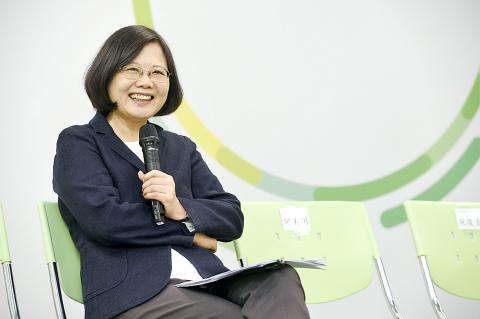Democratic Progressive Party (DPP) presidential candidate Tsai Ing-wen (蔡英文) yesterday announced her “Asian Silicon Valley” initiative, saying that the plan is to create the basis for business development for the next two decades and would welcome talent from all over the world, including China.
In a news conference at DPP headquarters in Taipei, Tsai said that if elected, she would seek to create an integral zone for innovative high-tech industries near Taiwan Taoyuan International Airport to attract talent from within Taiwan and abroad, and push for closer cooperation between businesses in Taiwan and in Silicon Valley in the US, while creating more opportunities for young people.
“I know many Taiwanese who live in Silicon Valley,” Tsai said. “A lot of them have been there for decades. They have rich experience and have accumulated assets. Many of them are investing in start-ups.”

Photo: George Tsorng, Taipei Times
“If we could make connections to this senior talent in Silicon Valley to give Taiwanese entrepreneurs more opportunities, to have more exchanges with angel investors on the US’ west coast, to connect Taiwan’s innovative businesses and capital market with the world, we could find a starting point to move forward,” she said.
Tsai said she does not plan to attract foreign direct investment in the traditional sense, but rather seek to better connect research and development in Taiwan and the Silicon Valley, as well as enhancing exchanges of talent between the two sides.
Taoyuan was chosen for the initiative because of its central location. It is within a three-hour flight of Hong Kong, Shanghai, Seoul, Tokyo or Singapore, as well as being midway between company headquarters in Taipei and research and manufacturing sites in the Hsinchu Science Park.
“The initiative sets the basis for development of Taiwanese businesses over the next two decades and is to overturn the outflow of Taiwanese talent and capital,” Tsai said. “The world is waiting on Taiwan and the DPP will move forward with all of you.”

Alain Robert, known as the "French Spider-Man," praised Alex Honnold as exceptionally well-prepared after the US climber completed a free solo ascent of Taipei 101 yesterday. Robert said Honnold's ascent of the 508m-tall skyscraper in just more than one-and-a-half hours without using safety ropes or equipment was a remarkable achievement. "This is my life," he said in an interview conducted in French, adding that he liked the feeling of being "on the edge of danger." The 63-year-old Frenchman climbed Taipei 101 using ropes in December 2004, taking about four hours to reach the top. On a one-to-10 scale of difficulty, Robert said Taipei 101

Nipah virus infection is to be officially listed as a category 5 notifiable infectious disease in Taiwan in March, while clinical treatment guidelines are being formulated, the Centers for Disease Control (CDC) said yesterday. With Nipah infections being reported in other countries and considering its relatively high fatality rate, the centers on Jan. 16 announced that it would be listed as a notifiable infectious disease to bolster the nation’s systematic early warning system and increase public awareness, the CDC said. Bangladesh reported four fatal cases last year in separate districts, with three linked to raw date palm sap consumption, CDC Epidemic Intelligence

US climber Alex Honnold left Taiwan this morning a day after completing a free-solo ascent of Taipei 101, a feat that drew cheers from onlookers and gained widespread international attention. Honnold yesterday scaled the 101-story skyscraper without a rope or safety harness. The climb — the highest urban free-solo ascent ever attempted — took just more than 90 minutes and was streamed live on Netflix. It was covered by major international news outlets including CNN, the New York Times, the Guardian and the Wall Street Journal. As Honnold prepared to leave Taiwan today, he attracted a crowd when he and his wife, Sanni,

Taiwanese and US defense groups are collaborating to introduce deployable, semi-autonomous manufacturing systems for drones and components in a boost to the nation’s supply chain resilience. Taiwan’s G-Tech Optroelectronics Corp subsidiary GTOC and the US’ Aerkomm Inc on Friday announced an agreement with fellow US-based Firestorm Lab to adopt the latter’s xCell, a technology featuring 3D printers fitted in 6.1m container units. The systems enable aerial platforms and parts to be produced in high volumes from dispersed nodes capable of rapid redeployment, to minimize the risk of enemy strikes and to meet field requirements, they said. Firestorm chief technology officer Ian Muceus said